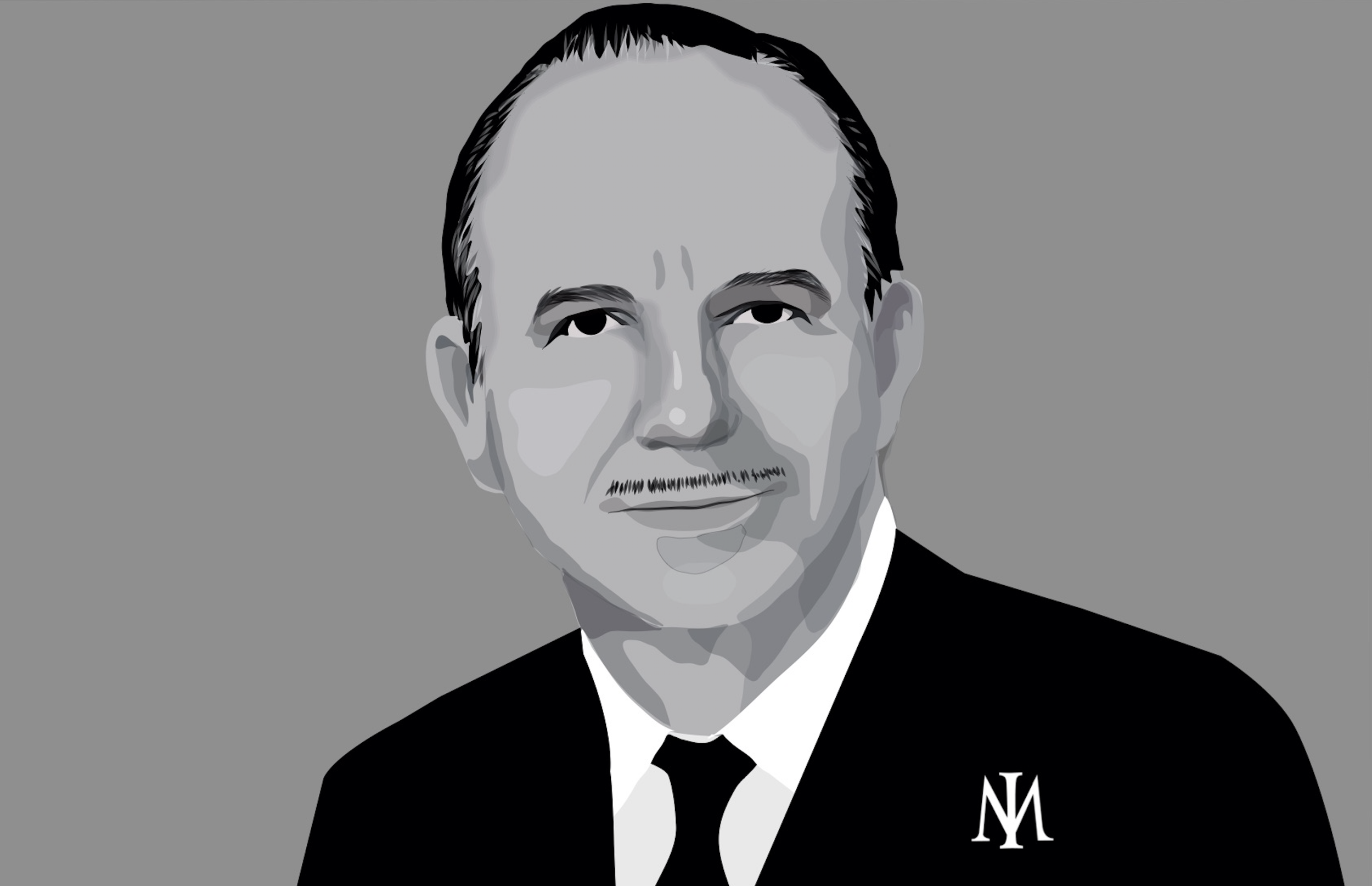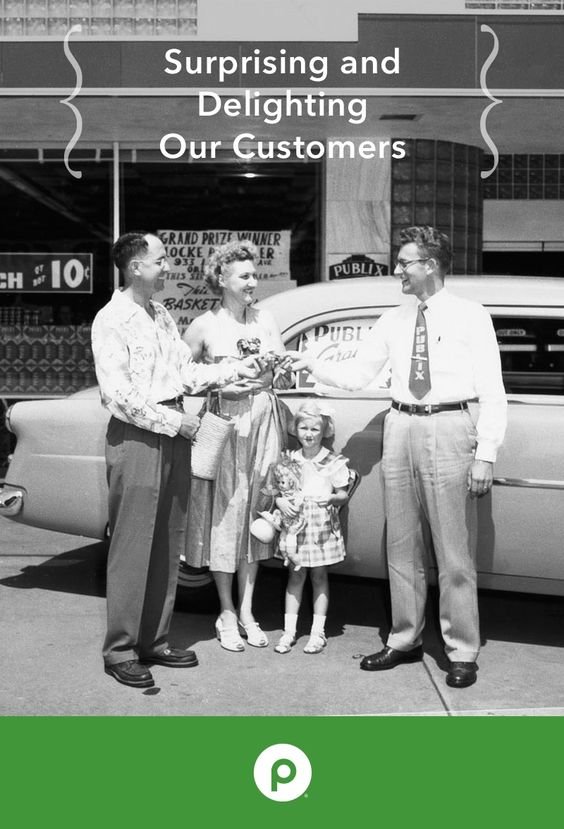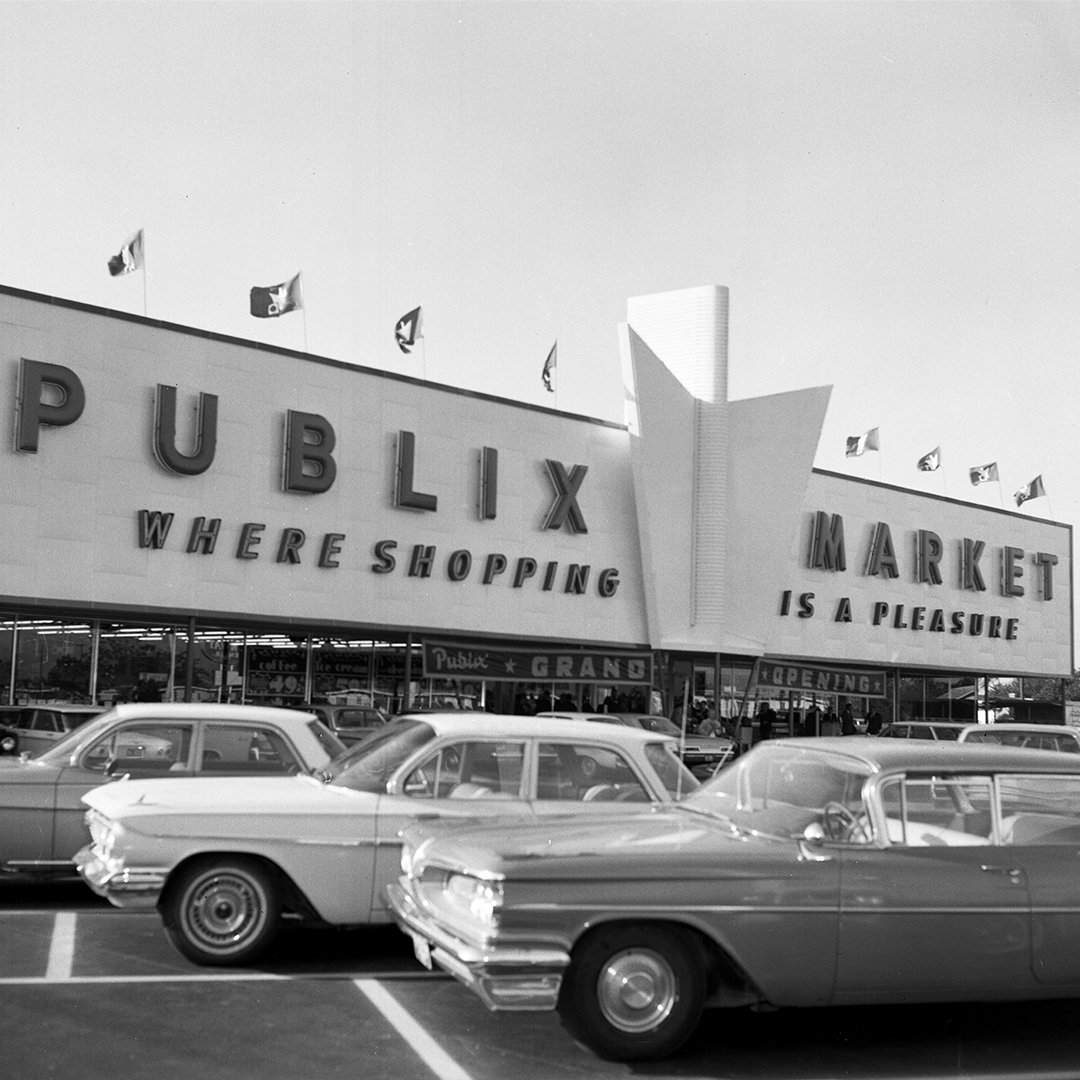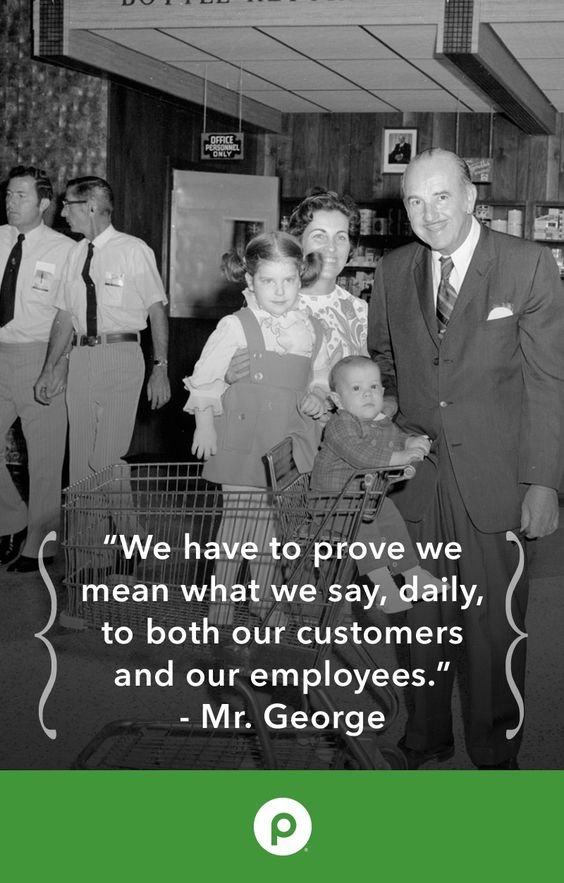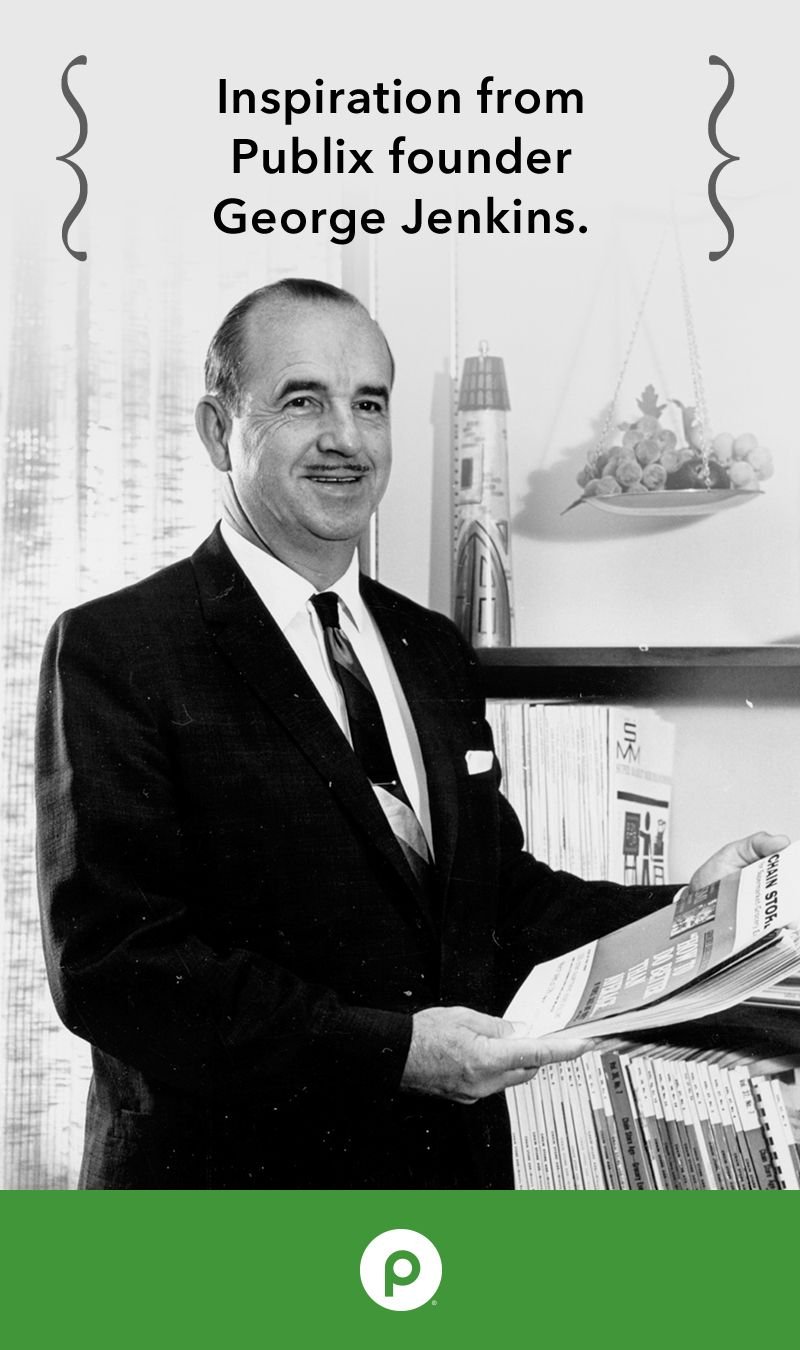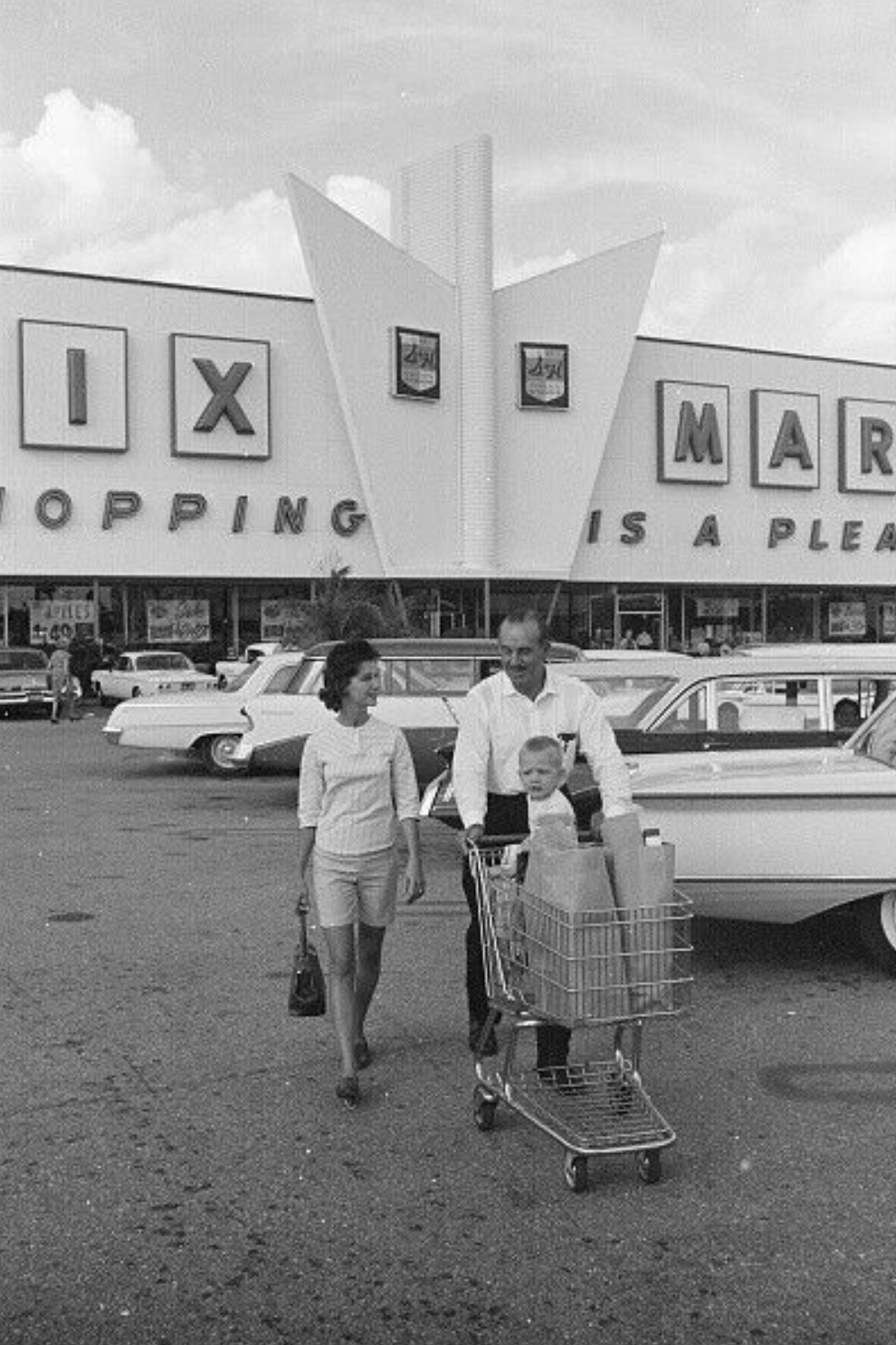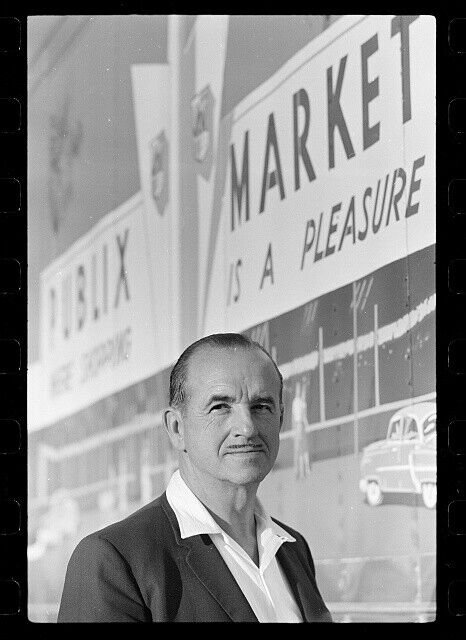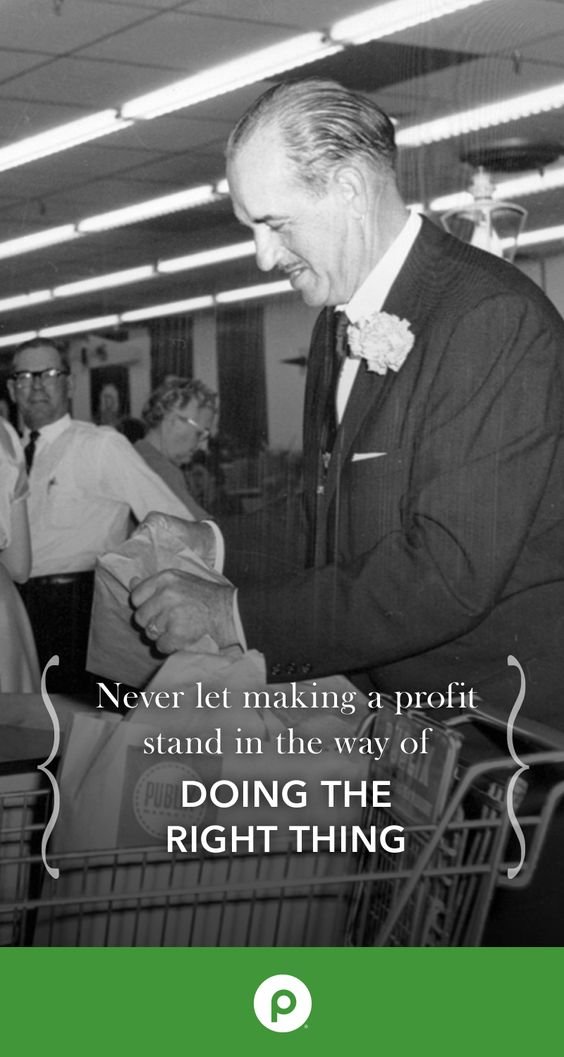How does a company in an intensely competitive industry become the world's largest employee-owned company, one that even captures the admiration of legendary investor Warren Buffett?
The company in question is Publix, a supermarket chain that has grown from a single store in Florida nearly a century ago into an industry titan. While Publix rode the wave of Florida's population growth, its visionary founder, George W. Jenkins, employed strategies reminiscent of some of the most successful businesses we've studied. In fact, if you refer back to the checklist we derived from one of Charlie Munger's favorite businesses, National Cash Register, you'll find that Publix not only checks off most of those boxes but goes above and beyond.
George Jenkins possessed a profound understanding of psychology and the paramount role of people in business. He grasped that business fundamentally revolves around people. From the very outset, Jenkins committed to sharing ownership and profits with the cashiers, baggers, butchers, deli clerks and bakers in his stores. He fervently advocated for employee empowerment and autonomy, affectionately referring to this approach as 'benign neglect.' Continuously in pursuit of fresh ideas, he fostered a culture of innovation and embraced the concept of failure as an inherent part of experimentation. Even though Mr. Jenkins passed away in 1996, his leadership legacy continues to shape the company to this day.
With an unquenchable thirst for knowledge and innovation, George Jenkins recognized that great ideas could originate from any source, leading him to listen more than he spoke and highly value the insights of those within the company. He frequently embarked on 'idea-seeking' journeys, extensively traveling to stay primed for opportunities and enhance the customer experience. His unwavering commitment to learning and perpetual quest to elevate customer satisfaction became pivotal to Publix's success.
Jenkins solidified a company-wide culture of promotion exclusively from within, ensuring the cherished familial atmosphere he diligently cultivated would extend to new stores. Every individual started at the bottom, irrespective of qualifications, and underwent cross-training across various divisions. This practice provided transparent career paths and instilled a profound respect in higher management for every role within the organization.
Warren Buffett has consistently emphasized the significance of studying business history, and in this regard, George Jenkins and the Publix business offer invaluable insights. As I explored Pat Watters' book, 'Publix: Fifty Years of Supermarket Pleasure,' which meticulously chronicles the history, philosophy, and evolution of Publix, it became clear that George Jenkins was not just an entrepreneur, but a man of unwavering integrity, boundless caring, and a profound sense of community spirit. The following quotes, sourced from this book and complemented by other references, exemplify the wisdom and principles of one of America's most successful and morally grounded business leaders.
Customer Focus
"If you are going to be in the retail business, the number one thing is to please the customer." George Jenkins
“Among the people of Publix, the will to take good care of the customer transcends strategy. It is an ingrained habit of mind with them, and a matter of principle.”
"The customer comes first. We don't de-emphasize the importance of our personnel policies. But everybody's main responsibility is to the stores and the customers.”
Source: Publix
“When the people of Publix tell about their work, they make it seem simple by referring often to the number-one goal of the organisation, the ideal and challenge of all that they do - pleasing the customer.”
"The difference between ordinary and extraordinary is that little extra." George Jenkins
"Always put the needs of your customers first, and the rest will fall into place." George Jenkins
"Our whole corporate culture is built around the concept George Jenkins developed in the '30s. He always said, 'Treat your customer as though she was your best girlfriend.' And around here that's the way it's done." Mark Hollis
“Another important Publix policy prevailed from the beginning - the Publix Guarantee. If a customer came back and said something was no good - George Jenkins didn't care whether it was bad or not- we gave her the money back, or something else for it. It was always a 100 percent guarantee. And it's always paid off. I'm sure we've been taken a few times but it's worth it. We all knew how Mr. Jenkins felt about customers. The customer was our boss.”
"We never want our customers to leave our stores disappointed for any reason… as Mr. George always said, 'If you take care of the product, it won't come back; if you take care of the customer, they'll always come back.' It's a very simple philosophy that I believe our managers really understand." Joseph Carvin
Obliquity
“A lot of businesses fall into the trap of setting economic goals, such as having a (certain) price-earning multiple on the company stock, or saying that volume and profits must increase by so many percent per year. People of such companies get caught up in meeting the goals, rather than giving good value. George Jenkins never fell into that trap.”
"If your objective is to do a better job, and money is secondary to you, then you succeed."
“Growth is the end result of a simple equation. As each of us continues to please our customers, more customers will look to Publix for their shopping needs. We must never lose sight of exactly what those needs are.” Howard Jenkins
Tailwind
“Publix was also riding the crest of the great wave of population growth in Florida that George Jenkins had foreseen as the basis for big expansion. The state's population was 1.9 million when George built his first proud new store in 1940. By 1967, there were 6 million Floridians to seek as customers. In 1979, there were 9 million.”
Continuous Improvement
“We’re gonna try to strive every day to make our service a little better and make our operation a little closer to perfect. I guess nobody’s perfect, but we strive for that goal anyway.” George Jenkins
"Success is a journey, not a destination." George Jenkins
Keep it Simple
“Publix has avoided getting itself tied up in complicated, structural knots. On a very large scale, it has held to the simplicity of the first store where everything was structured to please the customers.”
Philosophy Never Changes
“Some companies are founded on policy. This is wrong. Philosophy, the things you believe in, is more important. Philosophy does not change frequently – and is never compromised.” George Jenkins
Business is People
“We’re not only in the grocery business, we’re in the people business.” George Jenkins
“A large part of the Publix spirit had to do with treating employees right. We knew we could lick anybody with people. Prices and the right merchandise and the way the stores looked were important. But people were the most important.''
“People-orientation remains the most remarkable part of the Publix spirit.”
“I'm asked most frequently is "What's the secret?" "How did you do it?" The most obvious answer, of course, is one word .. people. The great industrialist, Andrew Carnegie, expressed it best when he said, ‘Take away my railroads, my ships, my factories. Destroy my equipment. Strip me of all my resources. But leave me my men and I will build it all back again.’ At Publix we have been successful in identifying and motivating the type of people who share our dreams and are willing to work hard to make them a reality.’ George Jenkins
“In other successful chains, merchandising -the strategic means we have seen for moving goods out of the stores - has been the main cause of success, with the strategies of operations and the calibre of people playing strong supporting roles. But at Publix, Personnel policy is . . . the most important reason for the success of the chain, with merchandising, operations and other factors playing the supporting role.”
“It's a people business. We'll only be successful as a result of people: our associates and our customers.” Joseph Carvin
Caring, Valuing, Empowering & Recognising People
"Take care of your employees and they'll take care of your customers." George Jenkins
“If you ask a Publix manager today what gives him or her the most satisfaction as a leader, they’ll likely say it’s the opportunity to help people grow successful careers.”
“You must, of course start with adequate salaries and effective employee benefits, but ideal employee-customer relationships cannot be accomplished without a sincere interest in your employees as real people. Our experience has shown that this is what spells the difference between 'mechanical' personnel who wait out the clock to go home, and personnel with a strong interest in the progress of the company.” George Jenkins
"My goal has always been to build a company that my employees would be proud to work for." George Jenkins
Source: Publix
“One of the most important lessons I've learned in my business career is that no man puts together an organization on his own.” George Jenkins
“In so many other ways has George Jenkins displayed an acute understanding of the psychology of the people who work with him, and a sensitivity to their needs. When plans were being drawn up for the first big warehouse and headquarters, he insisted that they include the cafeteria. The location was out in the country back then and Mr. Jenkins didn't want his people to have to drive all the way to town for lunch, or to have warehousemen doing their heavy labor on a brown-bag lunch of sandwiches. When someone protested that prices might cause a morale problem, Mr. Jenkins decreed that the meals be free. And he made sure that the menus and the cooking were top quality.”
“Publix has avoided unionization by providing better pay and benefits than unions could secure through collective bargaining.”
“The whole purpose for treating employees right is to motivate them to treat customers that way.”
“Most people who want to work, and who are reasonably good workers, can find jobs which give them salaries and benefits to take care of their basic physical needs. But people are looking for something more, and that something has to do with their relationship to THEMSELVES. You can call it self-respect or self-esteem, or individualism; but whatever you call it, it is, I believe, the key to motivation of most people working today. People must feel like PEOPLE, and not like numbers, or machines.” George Jenkins
“There is the conviction on the part of the people that management really cares about the individual. This is [commonly] expressed by personnel by the phrase, 'They didn't have to do this.’”
“Considerable organized effort is made at Publix to recognize individual employees and maintain the personal touch that has been a strength of the company since opening of the first store. The high point of this is the holding of Service Award Banquets every year in each district of Publix territory. Feted at these are employees who have completed ten years of service with the company, accompanied by their spouses. Also honored guests are ones who have completed additional five years' employment beyond the first ten, on up to 50 years. George Jenkins and Joe Blanton and as many other officers as can get there are on hand for the awarding of service pins and certificates attesting to the number of years served.”
“The common thread that runs through all the policies of the unwritten Publix philosophy is respect for individuals. Just as treating the customer right is an ingrained habit of mind for the people of Publix, so is treating fellow workers with consideration.”
“Because ‘the ordinary’ eventually comes to be taken for granted, an essential part of superior customer service is the willingness to step up, to take the initiative, to do something out of the ordinary. To delight the customer, a person must be empowered to do the unexpected - and they must be alert to the opportunity.” Joseph Carvin
“One of the things heard most often at Publix is Mr. George's statement, ‘Publix will be a little better place, or not quite as good ... because of you.’ The associate is reminded often of his or her importance. He or she is a stockholder. He or she has the power to make a difference.” Joseph Carvin
Hiring
"A company is only as good as the people it keeps." George Jenkins
"Integrity, morals, honesty [are the] the top qualifications. You have to be knowledgeable about your job, but I would rather have a man who knew nothing about his job but have him honest and moral. Then he could learn the job." Joe Blanton
“The emphasis is on selecting high-quality new employees. The personnel department was highly decentralized. Stores were largely autonomous, but got guidance and direction from headquarters. Training of employees was, as from the beginning, of the on-the-job variety.”
"At Publix, we have been successful in identifying and motivating the type of people who share our dreams and are willing to work hard to make them a reality.” George Jenkins
“Publix reaches out toward a certain kind of person, a certain segment in the market. These are people who care about a friendly relationship, who have the need for it. There is a great homogeneity between the kind of customers that come to Publix and the kind of people Publix has working at their stores. The customers like the employees, the employees like the customers liking 'them. It's like a cross-trump in bridge. It's just one of those beautiful things that feeds back and forth.”
“Nearly all people are capable of rendering great customer service. But some of them have a desire to serve customers, while others do not. Hire people who have the desire.” Joseph Carvin
Start at the Bottom - ‘Promote-from-Within’
“Publix always promotes from within, never filling jobs from the outside, requiring every employee to start at the bottom.”
“Each senior officer of Publix has had a solid grounding of starting at the bottom and working their way up.”
“Publix's culture of promoting from within is not just ‘strong.’ Virtually 100% of Publix managers started with Publix as hourly associates.” Joseph Carvin
Promote Ownership
“People ask me all the time, ‘How do you get people to be so nice? How do you get them to be so productive? How do you get them up early in the morning and work late at night?’ It’s easy. When people have ownership of something, they do what it takes to improve the value of that ownership. It truly does make a difference.” Ed Crenshaw
“When competition opens up across the street and our sales are impacted, [our staff are] impacted. So they're incented to make sure they're doing everything they can to serve that customer to the best of their ability." Ed Crenshaw
“From the very start, George Jenkins believed in profit sharing. He also believed in employee ownership. Everybody working for the store was a stockholder. And that was a good thing for morale.”
"I'm always amazed that more companies don't recognize the power of associate ownership," says Publix CEO Ed Crenshaw, 62, the grandson of founder George Jenkins and the fourth family member to run the company. While Crenshaw has a 1.1% stake in Publix, worth $230 million, and his entire family has 20%, worth $4.2 billion, the employees (and former employees) are the controlling shareholders, with an 80% stake, worth $16.6 billion. Not surprisingly none of them belongs to a union.” [Forbes]
“Publix employees are associates. They’re not employees. They’re co-owners.”
Source: Publix
“If stock ownership is spread across the entire workforce, as it is at Publix, then stock ownership is something that can be assumed among your co-workers. When all or most of your co-workers share that same sense of ownership, the dynamics get powerful. There's now a commonality, a sense of team. There is no market in Publix stock among the general public… This is one of the many things that make being a Publix associate special. It sets Publix apart from other large companies often considered ‘employee-owned.’ Not only do almost all your co-workers own stock, but you're part of an exclusive group of people working who can and do own stock. ‘Stock ownership, more than anything, it is the foundation for identification of the individual with the group.’ It isn't just that Publix associates own stock. Or even that most of them own stock. It's the fact that, with rare exception for a few heirs and gift recipients, they're the only ones who own stock. It's the fact that this ‘exclusive club’ sets them apart, and puts them all, store manager and cashier alike, together, on the same level at the top of the organization chart. If you like acronyms, think of it as ‘We’ thinking. That is, when stock ownership is both ‘Widespread ‘ among employees and ‘Exclusive’ to employees, it leads to thinking of the company as WE. At Publix, stock ownership is the third ingredient in Publix's recipe for superior customer service. Giving better service will help the stock price rise, but that's not what motivates associate owners to give better service. It motivates associates because it causes associates to identify, and to be identified, with each other, and with what their company is all about.” Joseph Carvin
“Publix pioneered a generous retirement program. Fifteen percent of net profit before taxes each year goes into a retirement trust plan which, in 1979, had total assets of $86 million, including the ownership of 12 shopping centers.”
"With employees who feel that 'this is my company' you bet we are hard to beat.’”
“I really believe that helping other people own part of the company and participating in worthy causes has been like the Bible says - cast your bread on the waters and it comes back tenfold.” George Jenkins
Share the Profits
“Publix gives profit-sharing incentive further down the line of employees than any other chain.”
“In addition to ubiquitous ownership, Publix grants shares of a store-specific bonus pool every 13 weeks. The exact amount varies, but typically 20% of quarterly profits go into that larger pool; 20% of the pool is then paid out in cash to the store's employees.” [Forbes]
“As in the very beginning, it is profit-sharing that makes Publix an industry leader in the payroll department. Twenty percent of the profit made in each store stays there at the end of each 13-week inventory period, to be divided among all full-time employees.”
‘‘Perhaps the two most important incentives are the profit-sharing plan and the stock ownership plan. All of our full time store people share in the profits of their individual retail operation. This is paid in cash at each inventory period. In addition to sharing the profit which they have personally been involved in producing at their own store, employees also share in the profits of the company through our profit sharing-retirement trust plan. Publix sets aside 15% of the net profit before taxes and places this in trust for all eligible employees. They have 100% vested interest in their trust with 10 years participation. This profit-sharing plan and trust now has total assets of almost $86 million.” George Jenkins
Staff Turnover
“Publix’s annual voluntary turnover rate is a minuscule 5% — which makes a mockery of the retail industry average of 65%.” [Fortune]
Cross-Train
“Publix associates are encouraged to rotate through various divisions, from grocery to real estate to distribution, to get a broad sense of the business.” [Forbes]
No Layoffs
"At Publix, our associates are our most valuable asset. That's why we have a no layoff policy, ensuring job security for all eligible associates."
“Publix has never laid off an employee in its 86-year history.” [Forbes]
Family Culture
“Publix is a family in more than a metaphorical sense, and how this is yet another source of the firm's human-oriented strength.”
“Employment at Publix is literally a family affair among the ranks of the company officials, with brothers and fathers and sons working side by side. Publix is a family affair not only for officers, but up and down the line of employees as well, including husbands and wives.”
Word-of-Mouth Advertising
"A satisfied customer is the best form of advertising." George Jenkins
“Those people that call on us [suppliers] have done as much to help create the image and reputation that Publix enjoys today as a lot of our own employees have. Their word of mouth about us gets around all over the country."
Reciprocation
“One of the ways that Publix has wooed customers during the expansion years has been to give them things.”
Complaints
“About complaints in general, of which there are not all that many. We don't look at it as a complaint, but look on it as an opportunity to get in there and really work with these people. Both ways. We work with our people who made the mistake so it won't happen again, and we try to make it up to the customer who was disappointed so that she'll end up thinking even better of us than she did before anything went wrong.”
Ideas
“Throughout his career, George Jenkins wanted to be ready for opportunities. He read extensively, and he often traveled on “idea-seeking” trips. He was always looking for ways to make the customer experience more of a pleasure. Of course, he also believed that great ideas come from the people within the company. He did more listening than he did talking. That’s a great lesson for anyone who wants to be successful!”
“George Jenkins kept abreast of developments in the food industry by traveling about the country for a week or so every year looking at grocery stores, seeing what other operators were up to, searching for ways they had devised to better please the customer. The zest for improvement and innovation was shared among the employees.”
Autonomy
“There is no better example of how the policies of the Publix philosophy dovetail and support one another than the one of ‘benign neglect’. Officers, supervisors and the workers themselves enjoy autonomy on the job because there is confidence up and down the line that they know their trade because of having been trained in every phase of it from the bottom up.”
“When you put an organization chart on paper, you are more or less telling each fellow that is his job. What happens is that he stops thinking about the other fellow's problems, and that sort of draws a circle around your men, instead of giving them lots of space to grow in.” George Jenkins
“In its territorial expansion, Publix avoided the pitfalls of bureaucracy, of having decisions made from headquarters that might be appropriate for the Lakeland area, but not for the local situation in Miami. It helped to have high calibre men with their grounding in the Publix philosophy going back to the first days of the chain, to put in autonomous control of the division.”
“George Jenkins policy was to very seldom come by to see how you are doing, and he didn't offer advice, or other help. ‘He gives you the opportunity to make a success on your own, or not to.’”
“There is a universal feeling of almost all Publix employees that they have this autonomy, this independence, and this responsibility, and this is one of the things that contributes to self-esteem.”
“Mr. Jenkins will not specifically tell you that you have to do it this way, or that you should make this much profit, or you shouldn't spend this much money. That is the beautiful thing about this company. It's true in the stores, in the warehouses, all parts. It's like working for yourself. People feel like the company is theirs.”
Innovation
“Publix faced, particularly in its territorial expansion, formidable opposition from other chains. It was, indeed, engaged in a fight for its very life when first it entered the Miami area. To survive and emerge triumphant in all the peninsula part of Florida took a concerted effort as far ahead of the times as was the first super market that George W. Jenkins built. During the years of great growth, the people of Publix developed innovative strategies for virtually every phase of supermarket distribution and storekeeping. This included the pioneering utilization of that important development of the 1950s, the shopping center.”
“George Jenkins and Joe Blanton functioned as a team in the location and building of new stores. “Mr. Jenkins could pick locations better than any man. We used to wonder why in the world pick this spot? Then pretty soon, the crowds would start pouring in." It is legend that George Jenkins and Joe Blanton used to fly about Florida in a company-owned helicopter seeking out superior locations. Part of the knack was to observe from the helicopter the housing patterns near a site, and the roads and highways leading to it. They wanted a site on a heavily traveled thoroughfare, but one not frequented by trucks or tourists. And they needed the potential of at least 2,000 families within a two-mile radius.”
“The first shopping center in St. Petersburg, was built in 1954. A Publix Super Market proudly occupied one of the locations. It was George Jenkins' decision to pay the high rent there, and subsequently in other early centers. Competitors such as A & P and Winn-Dixie were reluctant to do that in the early days of the centers. Back then Publix had a larger percentage of space in the centers than any other company in the state.”
“Of the total of 70 shopping centers that Publix has developed in Florida, some were financed by the sales-lease arrangement; some are owned by employees, and some (12) by an employee retirement trust fund. Little has been made in company publications or media studies over Publix's pioneering of shopping centers. But it stands alongside the pioneering of the super market itself as evidence of the remarkable business vision of George W. Jenkins and his lieutenants.”
Change
"The key to success in retail is to always be adapting and evolving with the times." George Jenkins
“If the railroads had remembered they were in the transportation business and not the railroad business, they could tell a different story. You must change to meet the times.” Joe Blanton
People : the Growth Limiter
“Promoting from within means that Publix has had ‘controlled growth.’ The company could open more new stores if it were willing to put people from other chains in charge of them. But such people wouldn't really be ready to manage a Publix super market. Having people ready to manage the stores is as important as a good location. If we should get away from that, we would erode the faith our employees and our customers have in us.”
Expansion
“Publix's policy of expanding only by building its own new stores. This is one more Publix anomaly in the grocery business. Most chains expand mainly by acquiring others. Publix prefers to build its own kind of stores and staff them with Publix-trained people.”
“We wanted to seed every store with as many experienced Publix associates as we possibly could, so that they could talk about George Jenkins and the history of the company and the philosophy of doing business, so we could transfer that knowledge to the new people we were hiring, so that they would know what makes this company successful.”
Walk The Floors
“You don’t learn much sitting behind a desk.” George Jenkins
Source: Publix
“I resolved that if I ever got to be a big shot in this business, two things would be done. I would go around and visit the stores. And if anybody wanted to see me, they could walk into my office any time. The two policies have proved over the years to be fundamental to Publix's organizational strength.” George Jenkins
“Mr. Jenkins shares this enthusiasm for visiting the stores, having established the practice as a founding policy of Publix. And so do other people of Publix up and down the line take joy and pride in their super markets.”
“Time and again, we have seen how the visits inspire confidence in workers and boost morale. In addition to the common practice of informal visits, there has been in recent years, an organized program of visitations twice a year. All officers participate. They go around and they see the people, they shake hands, they thank them. They talk to as many people as they possibly can. This tells that stock person, that front-service person- you know, doggone, they care about me. It makes people feel important. Publix management goes out of the way to keep employees from feeling depersonalized, like numbers.”
Open Door Policy
“People are not afraid to walk into Mr. Blanton's or Mr. Jenkins office and speak their minds. They don't take affront, but rather realize that the person is saying, "Here is a problem. How do we solve it? Indeed, the open-door policy is followed throughout the organization. There are very few cases, if any, where a worker at any level does not feel comfortable going to a department head or a manager and saying what is on his or her mind. The policy, obviously, keeps lines of communication open. It also helps Publix officials avoid the "status angle." And knowing you can talk to the bosses, on up to the biggest ones, any time you feel the need is bound to enhance the all-important self-esteem. Finally, the policy keeps the bosses in touch with what is going on at all levels.”
Good Profits
“We've got systems around here where everybody in the place is worrying about the company making enough money. So I spend part of my time checking up on the stores that make too much money. You can only make so much money out of a grocery store before you start cheating people.” George Jenkins
“We don't take any more profit than we have to take."
Win-Win
“So much of Publix's ability to treat the customer right derives from its treating others right those who supply the company, those who do the work in the stores and the warehouses of the company, the offices and the centers of distribution.”
“Appreciation for food-industry trading partners is institutionalized each year at a big Publix barbecue held in their honour. ‘That's the small way in which we try to repay them for the service they've given us,’ explained Mr. Jenkins.”
“George Jenkins has, from the beginning, insisted that Publix treat in like manner those with whom it does business. ‘In dealings with salesmen, never mistreat one or take advantage of one. Treat a salesman as though he were a guest in your home.’ George Jenkins said this was the philosophy he had always used.”
“Mr. Jenkins encourages buyers and other officials to visit suppliers' plants to learn all they can. We learn their problems and they learn ours and we try to work them out.”
Golden Rule
“Mr. Jenkins taught me a long time ago to practice the Golden Rule - to do unto others as you would have them do unto you. If you follow that basic principle, you're going to achieve what you want.”
Fanatic
“When Mr. George, as he was known, stepped down in 1989 after 59 years, the company had a stellar reputation and $5.3 billion in sales from 367 stores, all in Florida.”
"George Jenkins ran the company pretty much well into his 80's.” Ed Crenshaw
Tone from the Top
“When George Jenkins visited stores, it wasn’t unusual to see him stepping in to help bag groceries or take customers to their cars. Publix associates loved the opportunity to work side-by-side with Mr. George. While customers may have felt honored to have their bags carried out by the founder of the company, Mr. George felt more honored to serve them.”
"Lead by example and always be willing to roll up your sleeves and get to work." George Jenkins
“The things that are done at Publix ‘flow from the character’ of George W. Jenkins. He built Publix entirely on his own personality.”
"While most people work all their lives to see how much money they can accumulate, George Jenkins worked all his life to see how much he can give somebody else. Sizeable quantities of company stock are given away each year to employees of Publix.”
“I kept reducing my interest in the company," Mr. Jenkins explained recently. ‘Now I own only about four percent of the company that I started and did own 100 percent.’”
Respect
“If you want people to respect you and your company, you must show respect for them.” George Jenkins
Local Focus
“Of the staff selected to run the store in the shopping center that Publix built at the site, 98 percent lived in the immediate neighborhood. To Publix's way of thinking those who live in an area are best equipped to deal effectively with area shoppers - a policy that Publix adheres to with all its stores."
Reinvest Capital
“Profits were the fuel for rapid expansion. It was years before we ever declared a dividend. George Jenkins would just plow it back in and grow on it. The profits were invested in new stores, new equipment, real estate for shopping centers, warehouse and distribution facilities, and reduction of debts.”
“The profits were plowed back to make the company grow and produce even greater profits to be likewise plowed back.”
“All the profits were being plowed back into expansion. This probably accounts for the fact that, though Mr. Jenkins is looked upon as a very wealthy man, his limousine is often dusty, his trousers are frequently rump-sprung, and he owns no yacht, beach cottage, fishing lodge, or any of the other luxuries with which Florida tycoons surround themselves.”
Appearances
"Publix has always been known for cleanliness. When you enter a Publix, things are immaculate. The aisles are particularly wide and are wonderfully merchandised. The stores are bright and cheery green, and all of their associates, from managers on down, convey a highly professional image."
Competitive Advantage
“Officials of other chains request from Bud Ruth, director of personnel, permission to visit the stores and warehouses to learn the secrets of Publix's success.
‘I tell 'em,’ he reported, you can go out there and ask all kinds of questions and get some great answers. But how're you going to go back and plug this stuff into your organization? It's not going to be an easy task. Because this isn't something that's just happened in the past two or three or even eight or ten years. This is something that has been going on from the very start.
What Mr. Ruth was referring to is the extraordinary approach of Publix to employees and, through them, to customers that did, indeed, begin in the first little store. This approach is guided by a set of principles and policies which amount to no less than a highly sophisticated, subtle, philosophical system. The principles and policies dovetail and support one another, so that the whole of the philosophy is greater than its parts. It combines shrewd business methodology with a high level of morality to provide guidance to the people of Publix in attaining their goal.”
Lollapalooza Effects
“There’s no real thing you can put your finger on and say, ‘You do this and you'll be successful.' Success is an accumulation of little things. There's not any one big thing. The big things pretty well take care of themselves. But it's doing the little things unusually well that'll get you ahead in the long run.” George Jenkins
Smallness
“Autonomy stemming from the policy of benign neglect gives people the sense of working for a small company. Officers treat you like you're in a small company. Publix people don't realize how big the company really is. And that, of course, goes a long way toward explaining how Publix has held onto small-company motivation. The stress on autonomy is part of the reason that the people of Publix never say they work ‘for’ the company. ‘They work for themselves.’”
Headquarters and Bureaucracy
“Publix is not overloaded with a bureaucracy of officialdom. Business Week noted that in 1968, there were only 55 executives above store manager, and quoted Mr. Jenkins: "I know we are lean, but we like it that way. The main idea of this is to avoid having ‘layers of bureaucracy.’”
Mistakes and the Fear of Failure
“The Publix spirit back then, as now, left room for error on the part of employees. They are not afraid of managerial retribution if they try something and it doesn't work.”
“The Spirit of forgiveness prevails throughout Publix. In most companies, if you make a mistake, you never hear the end of it. But at Publix, if you make one, it's looked upon as one of the risks of trying to do things better and different. It brings out the best in everybody.”
“The only way we learn is by failing and learning from our mistakes." George Jenkins
Community
“Mr. George was once asked how much would he be worth if he hadn’t given so much away. ‘Probably nothing,’ he answered. Our founder instilled in us the value we have today of being a part of the community and helping wherever we can.”
"Success is not just about making a profit, it's about making a positive impact on the community." George Jenkins
“Mr. Jenkins and the other officers are not only active in civic affairs, but they also heartily encourage all employees to be so.”
Do the Right Thing
“Don’t let making a profit stand in the way of doing the right thing.” George Jenkins
Source: Publix
"I believe in doing things the right way, not just the easy way." George Jenkins
“People are treated right by Publix because it is right to do that.”
Focus on the Controllables
"I've heard George say that if something is worrying you, do what you can about it. If you can't do anything about it, then just quit worrying about it.”
Technology
“The people of Publix look at other technological advances in terms of what they will mean to the customers. Publix has handled the technological aspects of the business. They never get caught short on the technical end, but they do things because they are better for their customers. The quality of what they have to sell, in terms of product and service, is a lot more important to Publix than technological refinements."
Long Term
"Too many companies are subjected to the stock market and analyst calls, and it's all about what we can do to make sure this quarter we're projecting this and meeting this. We're in this business for the long haul - 83 years so far." Ed Crenshaw
Summary
In conclusion, Publix's remarkable success story underscores the significance of intangible assets such as a strong company culture, committed staff, and a philosophy of caring and sharing. These elements may not be quantifiable on balance sheets, but they play an indispensable role in driving a company's prosperity. George Jenkins, the visionary founder of Publix, instinctively grasped the value of these attributes and made them the cornerstones of his business philosophy.
When you study George Jenkins and the Publix legacy, you are essentially enrolling in a Master Class in the application of psychology to business success. His understanding of human psychology, his emphasis on empowerment, and his commitment to employee well-being are lessons that transcend conventional business wisdom.
As we reflect on the lessons learned from Publix, it becomes evident that Tom Peters was onto something profound in his classic book, 'In Search of Excellence.' The traits and practices that Peters highlighted in his book align closely with the core principles that have propelled Publix to greatness. Publix's journey is a testament to the enduring power of these principles and serves as a real-world case study of excellence found.
In today's ever-evolving business landscape, where competition is fierce and markets are volatile, companies that prioritize their people, nurture a vibrant company culture, and foster an environment of care and sharing are more likely to endure. While financial metrics are undoubtedly crucial, it's essential not to overlook the immeasurable value of these qualitative attributes.
In the end, Publix's journey reminds us that excellence is not merely a goal but an ongoing commitment to doing the right things, day in and day out. It's a reminder that success is not just about profits but also about the positive impact a company can have on its employees, customers, suppliers and communities. Publix has shown us that when excellence is embedded in the DNA of an organization, it becomes a source of enduring strength and resilience, and can allow a company to stand the test of time.
Sources:
‘Publix - Fifty Years of Shopping Pleasure, 1930-1980,’ Pat Watters. 1980.
‘A Piece of the Pie: The Story of Customer Service at Publix,’ Joseph Carvin ,2018.
‘The Public Checkout - Beyond the Aisles with Your Favorite Supermarket.’ Publix blog.
‘The Walmart slayer - how Publix’s people-first culture is winning the grocer war,’ Brian Solomon, Forbes, 2013.
‘My Five Days of Bleeding Green,’ Christopher Tkaczyck, Fortune, 2016.
Follow us on Twitter : @mastersinvest
* Visit the Blog Archive *
TERMS OF USE: DISCLAIMER

